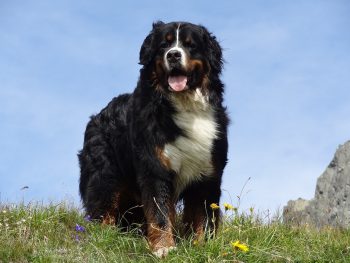Bernese Mountain Dogs, known for their gentle temperament and impressive size, require a specialized diet to meet their unique nutritional needs. This guide offers a comprehensive look at the ideal diet for Bernese Mountain Dogs, emphasizing the importance of balanced nutrition to support their health and longevity.
Understanding the Nutritional Needs of Bernese Mountain Dogs
Bernese Mountain Dogs are large, active dogs with specific dietary requirements. Their diet should be rich in high-quality proteins to support muscle health, balanced fats for energy, and carbohydrates for sustained activity levels. It’s essential to include a mix of vitamins and minerals to support bone health, immune function, and overall well-being-.
High-Quality Protein Sources for Muscle Health
Protein is a crucial component of a Bernese Mountain Dog’s diet. Look for foods where high-quality sources like chicken, beef, or fish are listed as the main ingredient. The right amount of protein supports muscle maintenance and repair, which is especially important for this large, active breed.
Balancing Fats and Carbohydrates for Energy
Fats are a concentrated source of energy for Bernese Mountain Dogs. Healthy fats like fish oil can also support skin and coat health. Carbohydrates should come from complex sources like whole grains, vegetables, and fruits to provide long-lasting energy and aid digestion.
Essential Vitamins and Minerals for Overall Health
Vitamins and minerals are vital for a well-rounded diet. Calcium and phosphorus are essential for maintaining strong bones, while vitamins such as A and E support vision and skin health. Ensure the chosen dog food is fortified with essential nutrients.
Feeding Guidelines: Portion Sizes and Frequency
Portion control is critical to preventing obesity in Bernese Mountain Dogs. They typically require more significant portions due to size, but monitor their weight and adjust quantities accordingly. Feeding two meals daily is recommended to aid digestion and prevent bloat, a common issue in large breeds.
Special Dietary Considerations for Puppies and Seniors
Bernese Mountain Dog puppies and seniors have different nutritional needs. Puppies require more calories and nutrients for growth, while seniors may need a diet lower in calories and higher in fiber. Adjust the diet according to their life stage for optimal health.
The Importance of Hydration for Bernese Mountain Dogs
Hydration is crucial, especially for large breeds like the Bernese Mountain Dog. Always provide access to fresh, clean water. Wet food can also contribute to their water intake, which benefits dogs that may not drink enough water.
Managing Food Allergies and Sensitivities
Like many breeds, Bernese Mountain Dogs can develop food allergies or sensitivities. Hypoallergenic diets or foods with limited ingredients can help manage these conditions. Watch for signs like itchy skin, ear infections, or digestive upset.
The Role of Diet in Weight Management
Maintaining a healthy weight is essential for Bernese Mountain Dogs. Overfeeding can lead to obesity, which puts additional strain on their joints and can exacerbate health issues. Measure food portions and monitor their weight regularly.
Treats and Snacks: Healthy Options for Bernese Mountain Dogs
Treats should be given in moderation and chosen wisely. Healthy, low-calorie treats are preferred. Avoid human foods that are toxic to dogs, such as chocolate, grapes, and onions.
Preventing Bloat with Proper Feeding Practices
Bloat is a serious health risk for Bernese Mountain Dogs. To reduce the risk, feed smaller, more frequent meals and avoid vigorous exercise right before and after eating. Elevated food bowls can also help.
Dietary Supplements: Are They Necessary?
Supplements like fish oil, glucosamine, and chondroitin can benefit Bernese Mountain Dogs, especially those with joint issues or skin conditions. Always consult with a veterinarian before adding supplements to their diet.
Avoiding Harmful Foods and Ingredients
Certain foods are toxic to dogs and should be avoided. This includes chocolate, caffeine, grapes, raisins, onions, and garlic. Always check the ingredients of commercial dog foods to ensure they do not contain harmful additives.
In conclusion, feeding your Bernese Mountain Dog a balanced diet tailored to their needs is crucial for their health and wellbeing. Regular consultations with a veterinarian can help ensure their dietary needs are met and can aid in making any necessary adjustments. With the proper nutrition, your Bernese Mountain Dog will have the vitality and health to live a long, happy life.
What Health Issues Are Bernese Mountain Dogs Prone To, and How Can a Proper Diet Help?
The post Ideal Diet for Bernese Mountain Dogs – The Ultimate Bernese Mountain Dog Feeding Guide appeared first on iHeartDogs.com.

